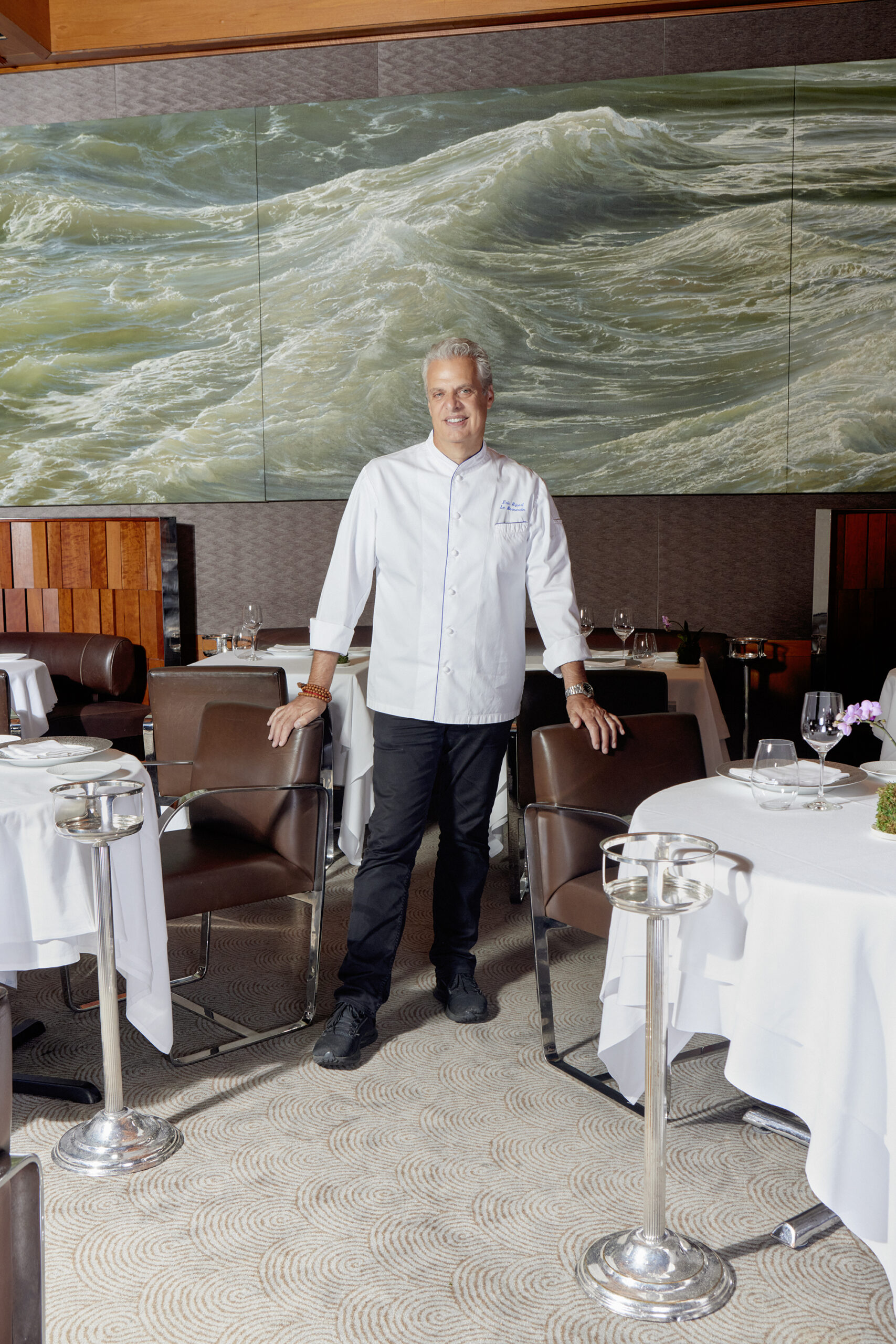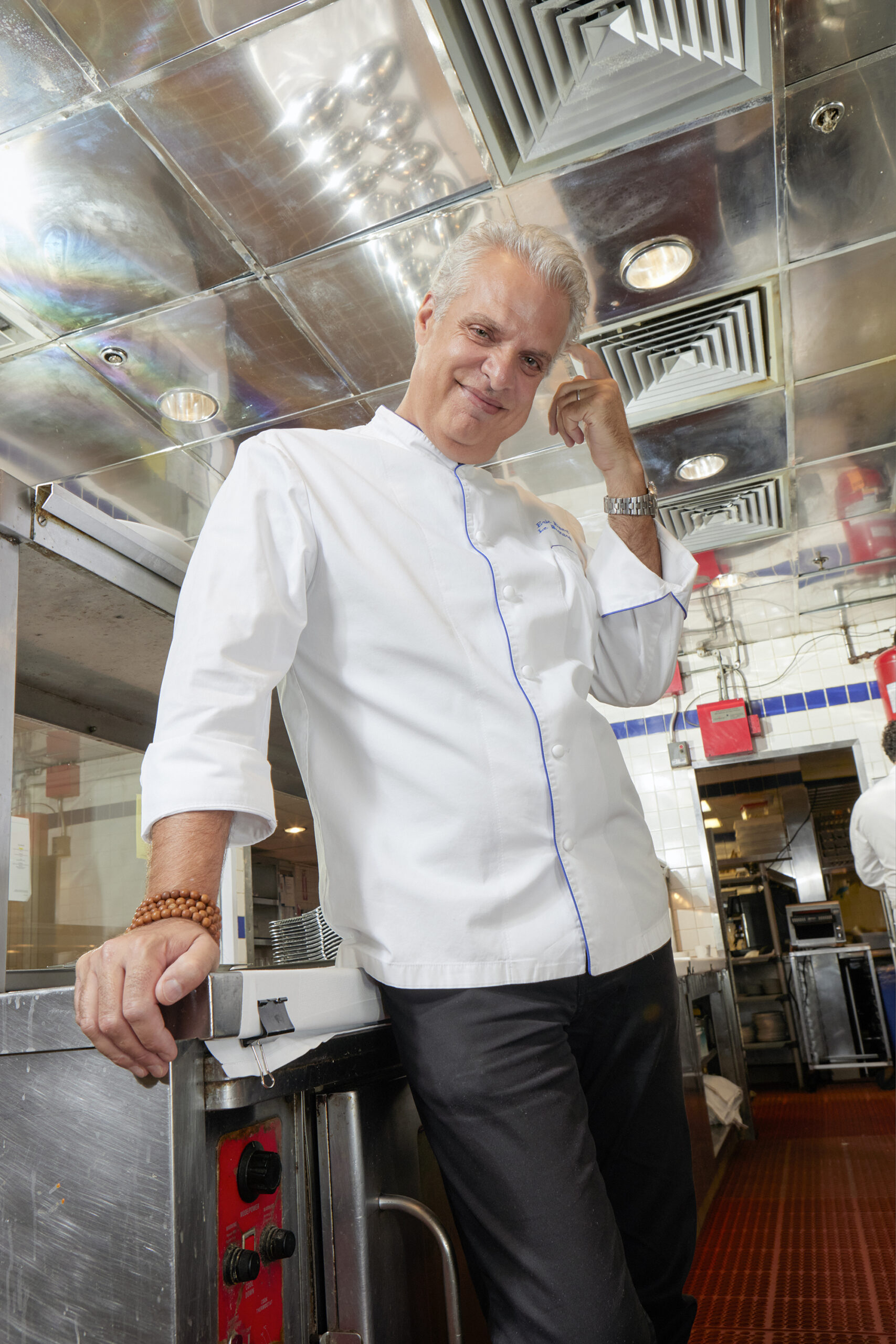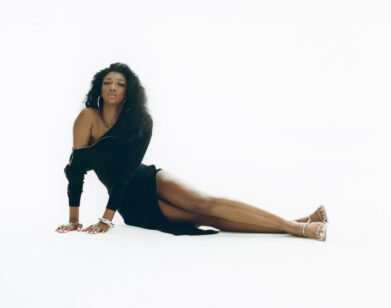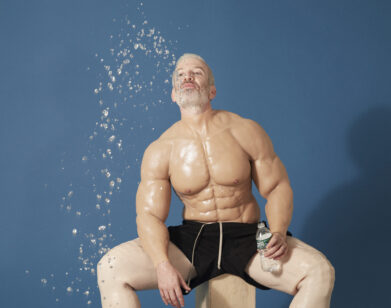chef
Eric Ripert on Markets, Microdosing, and the ABCs of Cooking
Is Eric Ripert the best chef in New York? That’s a matter of taste, but there’s no doubt that the mastermind behind Le Bernardin, the city’s shrine to seafood and sauces, has done more for the elevation of fish than rising sea levels. As he gets set to reveal his trade secrets in Seafood Simple: A Cookbook, the three-Michelin-starred Frenchman got together with food-world charmer Andy Baraghani to talk about markets, microdosing, and the ABCs of cooking.
———
WEDNESDAY 4:30 PM SEPT. 6, 2023 NYC
ANDY BARAGHANI: Hi, Chef Ripert. I thought you might have a calm background, maybe some books. But instead you have your Michelin stars, your Emmys, a Tibetan tapestry, I think. It is not a low-key background by any means.
ÉRIC RIPERT: [Laughs] I’m sorry! That’s my office.
BARAGHANI: It’s a beautiful office. On a personal note, I’ve been a longtime admirer. I have the utmost respect for you as a cook, as a food writer, as a New Yorker, so thank you for taking the time today.
RIPERT: It’s my great pleasure.
BARAGHANI: I want to start by going back to your childhood, because you grew up in Antibes, and I was there a few weeks ago. How did that area affect your approach to food?
RIPERT: Well, I had one grandmother from Italy and another from Provence. And living in Antibes, as you saw, you have access to incredible seafood from fishermen, and the produce is magnificent. You can smell the basil a hundred yards away from the market. I thought every kid was eating like me.
BARAGHANI: So it was a full sensory experience.
RIPERT: Yes. I always had a great passion as a child for eating, but not necessarily cooking. But I was always in the kitchen watching. When I got a bit older, I would be involved with the shopping and prepping a little bit. But looking back I always wanted to be a chef, and actually, I always wanted to be the chef that I am today.
BARAGHANI: I think about this a lot, because I’m a first-generation American. My parents are from Iran, and I was born and raised in Berkeley, California, a very special place when it comes to food in this country, and I grew up eating very, very well. I always knew that I wanted to go into the world of food and that it would be my profession, so my relationship with food and cooking has changed over time because it’s now my career. I’ve been asked this question a lot, and so I want to pass it on to you. How has your relationship with food and cooking changed as the stakes have gotten higher?
RIPERT: It never really changed. As a young man I wanted to go to culinary school and then work in the best restaurants in France. I wrote letters to 18 three-star Michelin restaurants. I had an obsessive vision of what I wanted to do. I didn’t want to be a chef in a bistro or cafe or brasserie, and not in a one-star restaurant. I wanted to be in a three-star restaurant, which means fine dining, having the best products available, and an army of cooks around you to help you with your vision. I put all my energy in that vision from the age of 15. At 17, I was in Paris working in a three-star Michelin kitchen, suffering tremendously because I didn’t know anything about cooking after school. But by 24, I was in the U.S. and on my way to Le Bernardin. I always had that goal of wanting to create very specific foods inspired by my childhood, my roots, and my experience traveling the world. I’m basically, and I’m not joking here, living the dream. This is what I always wanted, and I have it.
BARAGHANI: You’re known as an authority figure when it comes to seafood, which brings me to your book. As someone who has worked in restaurants and food media, I’m aware that seafood still seems to be an area that home cooks have a tremendous amount of insecurity around. What are some key differences to know when preparing seafood versus, let’s say other proteins?
RIPERT: Well, seafood is very delicate by nature. It needs a lot of attention. You have to know how to buy fresh fish, you have to know the right technique, and then you can succeed. A lot of people are intimidated because they had bad experiences. They went to the store, bought fish, brought it home, put it in a pan, it stank, they tasted it, it was disgusting. The fish was breaking, it was dry, it was overcooked, it was not cooked. And when I look at the cooking wisdom that I have accumulated, I’m very comfortable demystifying every-thing you need to know to make your experience a success. It’s not rocket science, but you need to have someone with experience guiding you. It took me 40 years of experience to create the book.
BARAGHANI: Are there specific techniques or ingredients that you want to highlight?
RIPERT: We teach you how to season, and I have a page dedicated to seasoning with salt and pepper. I’m going to show you the page right here, where you can see my hand.
BARAGHANI: Eric, it’s not your finger. We know you got a hand model for this.
RIPERT: [Laughs] That’s me. I’m five inches on top of the filet with clean fingers, because if your fingers or hands are wet or humid, you’re not going to be precise, and you cannot be too close to the fish or too high. You start from left to right or from right to left, and then you flip the filet and you season again. This is one of the ABCs of cooking.
BARAGHANI: Do you season early on or right before?
RIPERT: I like to season at the very last minute because the salt has the tendency to cook the flesh of the fish and remove the juice, which you don’t want. Except if you make a ceviche.
BARAGHANI: I want to put a pause on all things seafood and go to the topic of mushrooms. You’ve acted as a culinary advisor to Nature’s Fynd, an alternative protein company. What role do you feel a prominent chef like you has in changing the way people eat?
RIPERT: Nature’s Fynd are working with a fungi which is actually a protein that contains fibers and the 20 amino acids that the human body needs. It’s a superfood. They have created with fungi a cream cheese that is very, very similar to dairy. It’s fascinating because it could be in many ways the future of food. When it comes out on the market, it’s going to be a killer.
BARAGHANI: Sticking with mushrooms, I have to ask, have you tried magic mushrooms?
RIPERT: Never. I know it’s a trend, everybody’s saying you should microdose, and I don’t know if it’s legal, but I’m curious. Supposedly it’s good for you, but I’m totally ignorant about it.
BARAGHANI: There’s still time. I’m curious, who were your mentors in the culinary world? And also, who are your close friends in the food world?
RIPERT: Joël Robuchon was one of them. Jean-Louis Palladin at the Watergate Hotel in Washington was one of them as well. Gilbert Le Coze at Le Bernardin, when I started, was also very important in my career. One taught me the basics and how to learn techniques, the other one helped me to become creative, and the last one taught me how to manage a team in a kitchen. Now, I have a lot of friends in the industry. I don’t think I have enemies, but I may.
BARAGHANI: I’ve worked in the California and New York restaurant scene and I think you’re very much a beloved figure.
RIPERT: Good. I have a lot of fun when I go out with José Andrés, Daniel Boulud, and Jean-Georges [Vongerichten]. Those guys are a bit older than me, but they believe they’re younger.
BARAGHANI: Are they aware that you’re considered a sex symbol in the food world?
RIPERT: What!?
BARAGHANI: Look, Chef Ripert, I’m not hitting on you. I’m in a very, very happy relationship and I know you’re not gay, but I will say this is a thing, so I hope you lean into it. You should definitely use that as bragging rights to Daniel Boulud and Jean-Georges and José Andrés. Make sure you tell them, “Andy Baraghani said that I’m considered a sex symbol.”
RIPERT: I don’t know where it’s coming from, but when you open the door of a kitchen, nobody cares about if you’re good-looking or bad-looking or if you have white hair or dark hair. There are no sex symbols in kitchens.
BARAGHANI: You either know how to cook or you don’t.
RIPERT: Exactly. And that’s what matters.
BARAGHANI: You’ve been in New York since you were 24 and you’ve seen the food scene change so much. What’s your take on New York’s food scene at the moment?
RIPERT: What I see today is we have a lot of influence coming from South Korea. You have restaurants like Atomix, and actually, that couple owns Naro and Atoboy as well.
BARAGHANI: Great restaurants.
RIPERT: And you have Jungsik downtown. It’s the first time that I see Korean restaurants keeping the loyalty of their roots, but also evolving and making it extremely, extremely refined. I don’t think it’s a trend, but it’s new to New York. Twenty years ago, there were no Korean restaurants in the city that were so revered for their cooking. You were going there because you had fun and so on. So this is important.
BARAGHANI: Let’s say you have a day off, no obligations, no book deadlines, the monkfish came in today, the turbot is looking great. What are you going to prepare for yourself and for your family for dinner?
RIPERT: That will happen on Sunday when I take my day off. It’s going to be something seasonal. If we have the markets open in New York, I’ll go to the market and find some vegetables and fruits, and depending on what I find, I’ll decide what the protein will be. It could be seafood, and in that case, I’ll come to the restaurant and bring it home and cook it. Very often, I decide to cook something else. Yesterday, we had an entire meal for lunch that was vegetarian with about 15 options. I started to cook early in the morning because I went to the farm and I had beautiful corn and produce and tomatoes and so I went nuts. The day before I was cooking lamb and grilling sausages.
BARAGHANI: I want to confirm, you’re not cooking seafood at all on the weekends, you’re eating meat and vegetables?
RIPERT: Well, I eat seafood for lunch and dinner, Monday to Friday. On the weekends, sometimes I do eat seafood. Let’s say, if we find some beautiful bay scallops.
BARAGHANI: Love that. Maybe it’s not crazy for you, but I think it’s crazy that we haven’t met properly before, so I’m very much looking forward to coming over and cooking with you. I’m inviting myself.
RIPERT: Oh, that would be nice. With great pleasure.
———
Photography Assistant: Iain Emaline.
Location: Le Bernadin.








